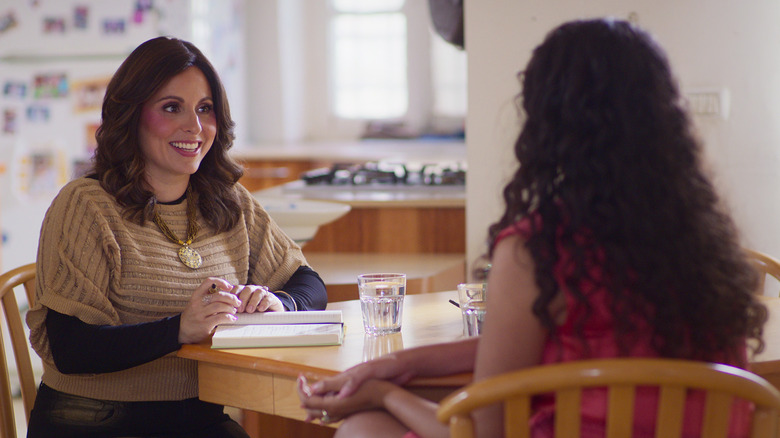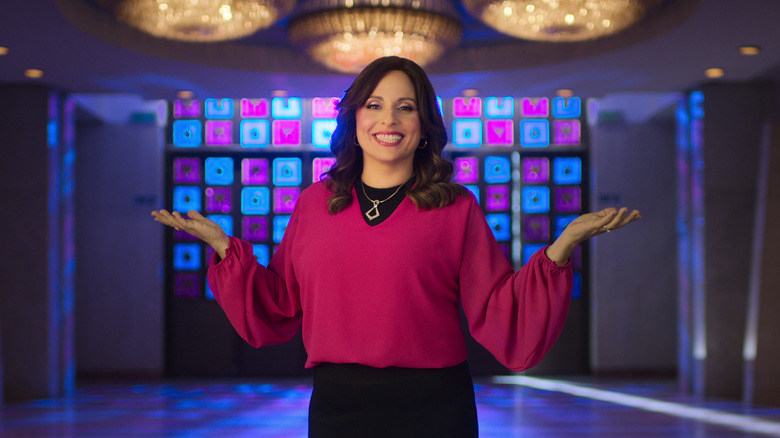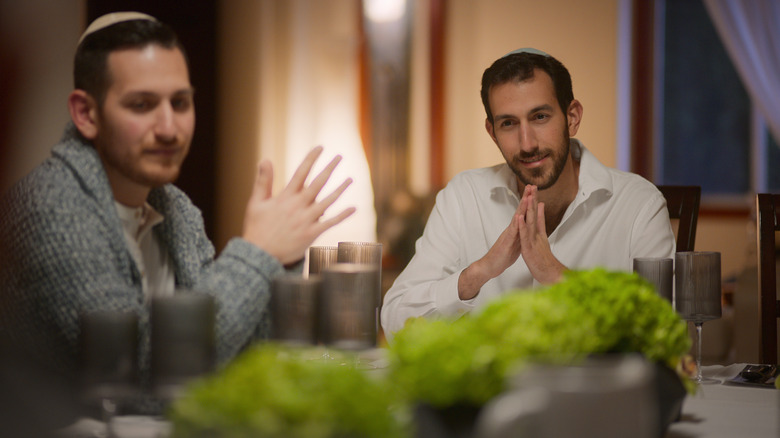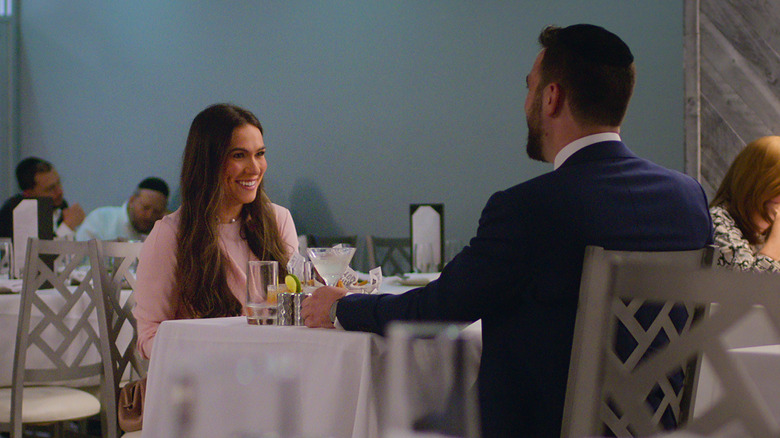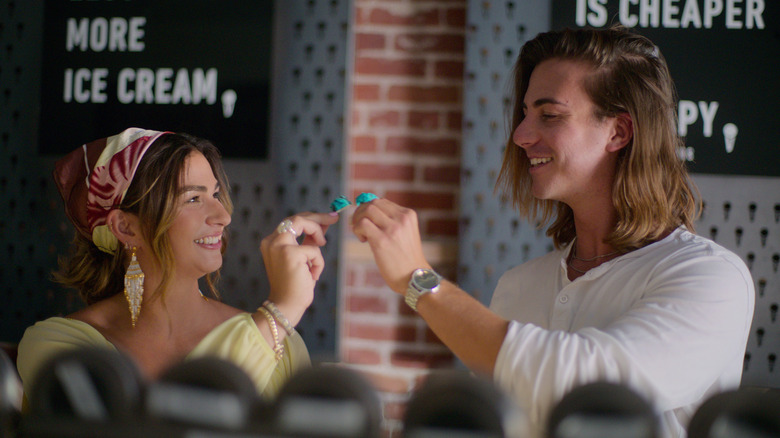Netflix Producer Ronit Polin On New Reality Dating Series Jewish Matchmaking - Exclusive Interview
Move over, Bachelor Nation. A new reality dating series is now streaming on Netflix: "Jewish Matchmaking." Following the success of Netflix's Emmy-nominated hit series "Indian Matchmaking" comes this spinoff about a Jewish matchmaker helping Jewish singles find love. According to Netflix's official synopsis, "A new series from the producers of 'Indian Matchmaking,' 'Jewish Matchmaking' features singles in the U.S. and Israel as they turn their dating life over to top Jewish matchmaker Aleeza Ben Shalom. Will using the traditional practice of shidduchim dating help them find their soulmate in today's world?"
In this digital age of dating apps and swiping left or right, a show about matchmaking showcases an interest in this old-fashioned, age-old practice which has existed for thousands of years. And it turns out that it just may be the dating trend we didn't know we needed, with more members of Gen Z apparently wanting to forgo dating apps these days to instead meet people in person.
The List had the opportunity to speak with Ronit Polin, one of the producers of "Jewish Matchmaking," who was behind the 2015 FYI reality series "Arranged." We've got the inside scoop on the series and her role in helping bring "Jewish Matchmaking" to the masses.
All about Netflix's Jewish Matchmaking
What can you tell us about "Jewish Matchmaking"?
Following the success of "Indian Matchmaking," this is a new show focused on Jewish matchmaking. It's quite interesting. It's about taking traditional notions of love and marriage and seeing how they can be applicable or making them applicable in today's world.
It features Aleeza Ben Shalom, a successful matchmaker who meets singles who have never used a matchmaker before, who maybe were a little hesitant at first but want to find love. The one thing that everyone has in common: They're committed; they want to get married. They're very diverse, which is cool because you have people across the Jewish spectrum. You have from quite irreligious to quite Orthodox. The unifying thread is that they all want to get married and they're willing — some of them more than others — to suspend a little disbelief or [wariness] and try using a matchmaker to find their "beshert," as we say, to find their other half.
How are the singles cast on the show? I can think of a couple of friends who would be great for it.
I can't even tell you [how often] everyone's coming over to me, asking, "Is there going to be a Season 2? because I want to be on the show. My neighbor wants to be on the show. My cousin would be perfect for the show. My brother needs the show." Part of the reason, perhaps, they chose [Judaism] as the next culture to try the spinoff of "Matchmaking" is that Jewish people are very into getting married and helping their friends get married and setting people up, and sometimes almost in an unwanted way, like the grandma is like, "When are you getting married already?" It's definitely part of the culture. When they ask me, I say, "Hopefully, there'll be a Season 2." We don't know yet at this point.
We had casting directors [working with] Aleeza. She has an entire roster of singles from around the world. She knows people from so many different places and different experiences. She goes out and meets tons of people, so [with] her giant network, we found some great people.
How did the concept for the series come about? I know that "Indian Matchmaking" has been a hit on Netflix.
It was pretty much that, following up on the success of "Indian Matchmaking," which was nominated for an Emmy and received such widespread positive feedback. So we're thinking, "What other cultures do this?" And the Jewish matchmaking tradition is very rich and has been around for a long time.
The interesting thing is, you might think Indian matchmaking is probably completely unlike Jewish matchmaking, but from working on the show and having seen "Indian Matchmaking," there's a surprising number of similarities in that the family is often heavily invested and the singles are walking this tightrope between modernity and trying something that's pretty traditional and maybe a little bit out of their comfort zone. It's cool when you can see disparate cultures that, at first glance, look so dissimilar, and then you say, "Wow, we're really more alike than we think."
Her role in producing the series
Tell us about the role you played in producing the series and why it was important to the show.
My title is "consulting producer." I'm an Orthodox Jewish person. I was sort of the "Jewish expert" on the show, having been born and raised Orthodox and having used a matchmaker myself. I met my husband through a matchmaker, and I was using it for years. The Orthodox, by and large, are the most comfortable using matchmakers.
My role was to ensure that the show was accurate, authentic, positive, celebratory, that it was a real, truthful, and positive depiction. I think it was hugely important, and I give kudos to IPC, the production company, and Netflix for realizing, "We're making a show about Jewish people. Let's get it right. Let's make sure it's accurate."
So many times we watch things, and they're so misinformed or inaccurate, and it's so frustrating to watch. There'll be basic fallacies about the Jewish religion or culture, or sometimes stereotypes, even bordering on antisemitic tropes. Maybe they didn't realize that, but it's really painful as a Jewish person to see that — and more than painful, it's really dangerous, especially with the rise of antisemitism.
Actually, in 2019, the FBI found that Jewish people were [2.6] times more likely to be victims of a hate crime than even Black people, [2.2 times more than] Muslim people, [and more than] any other minority group [a statistic that has risen by 20% since]. So I feel that accurate representation is a matter of life and death. These negative stereotypes and inaccuracies fuel antisemitism, and we can't afford to have that. Kudos to the show for wanting to make sure everything was authentic.
It was also an enjoyable job. I wasn't just dealing with deep and heavy things all day. I helped explain the Jewish culture and Jewish traditions and the matchmaking tradition. I served as a liaison, sometimes, between the production team and the singles, particularly the Orthodox singles. The Orthodox singles told me they were much more comfortable doing the show with an Orthodox producer since they knew that someone who understands them is behind the scenes.
How do you think including a variety of couples from different religious backgrounds within Judaism contributes to the show's effectiveness?
It was a beautiful rainbow, and it showed the breadth of Judaism and Jewish observance. There wasn't just one way to be Jewish. Maybe when people who haven't had much contact with Jews think of Jews, they think of Hasidim or [another particular] type, but there are so many different types and different levels of religious observance. I felt like the show united them all. That was beautiful to show the diversity. I know "diversity" is a big word, but it was nice to see the diversity of the Jewish experience.
I know you produced the 2015 FYI series "Arranged," so I was curious whether your experience on that show contributed to this one in any way.
I was the development producer on "Arranged," and "Arranged" was loosely about the term "arranged marriages" among different cultures. I put it in air quotes because some were more arranged, and some were just heavily traditional. But there were some similarities. It was good preparation for working on "Jewish Matchmaking" and for me to understand the behind-the-scenes inner workings of creating a TV show firsthand and then coming here with that experience.
Transitioning from theater to film to TV
Your creative work began in theater with writing and directing plays before moving into films. How did you transition to TV?
I honestly had a cool backstory. I don't think there are many producers today who can say they started out writing and directing Orthodox plays, specifically theater for Orthodox people.
In the Orthodox world, by and large, people who are very much right-wing Orthodox don't watch TV and don't go to movies. So [for them], plays, productions, theater is a huge form of entertainment, one of their only forms of entertainment. When you think about a play, you think of 20 people on stage and 75 people in the audience, but these were very massive productions with a cast and crew of 300. And we'd have 1,000 women a night because it's segregated. It's women only — 1,000 women a night for five nights.
I'd be writing original plays and then directing them. It was so fascinating to watch my vision come to life. [These are] words that you scribble in your living room at midnight on your script, and then people are seeing it or saying it in living color, wearing the costumes you envisioned. That was fascinating.
Then I said to myself, "All these players are wonderful, but the Orthodox community doesn't really have films that they could watch that they would consider kosher." So I set out to change that. I ended up writing and directing and self-producing because it was unknown at the time. It was a new, unknown genre, the very first Orthodox women's film for Orthodox women by Orthodox women. I remember saying, "Either I'll get banned and shunned, kicked out of the community, or I'll be a big success." It could have gone either way.
I was single at the time, speaking of marriage, and my mother was like, "Are you sure you want to do this? How are you going to get married after you're making a movie? Oh my gosh." But I took a risk. Thank God it paid off. It was very, very popular, and it ushered in a new era where other people said, "We can also make movies. We'll make them kosher, acceptable to this community, but there's nothing wrong with the film genre as a medium."
Then, after I had found some success with these plays and films and I was a little bit of a well-known name in, I guess you'd say, Orthodox entertainment, the executive producers of "Arranged" came calling and wanted me to work on a slightly different show. Then I pitched the concept of "Arranged" to them, and we ended up working together. That was my segue from theater to film to TV.
The role that psychology plays on stage and on screen
You also have an interesting background considering your training and your experience working as a school psychologist and as an English teacher. How would you say this background helps you in your filmmaking, directing, writing, and producing work?
That's an interesting question. Yes, I started out as an English teacher. Actually, I continued teaching English even after I was a school psychologist because I loved the classroom. I did start out teaching sixth-grade and then later eighth-grade English. I taught eighth-grade English probably for 20 years. Then, at some point, I also became a school psychologist. I was doing [that] one half of the day and teaching the other half of the day.
In terms of psychology, the commonality between plays, films, and TV and a love of psychology is a love of understanding human nature and storytelling, understanding what makes people tick, and trying to figure out how people react in different situations. I love anything related to identity and how people understand their identity in the world and make their way through the world with their identity that's ever-changing. Psychology knowledge and a passion for psychology [help] when you're either creating characters or working with real people in TV and film and plays. That's the psychology element.
The teaching element is that I'm pretty comfortable in an instructional role or in a directing, producing role. I went from producing things in the classroom to directing and producing plays or films to now helping produce a show. So that's the commonality of them. My mother would say ... I just like to run things. [laughs]
What excites you most about finally sharing your work on this series with the rest of the public?
Everything excites me, but let me pick. It feels like this best-kept secret that I've known about, been working on for two years, and now it's finally [happening]. Imagine carrying this thing for so long, and then the world can see it. That part is amazing, and I'm so excited.
Also, I'm very proud of it, so I'm proud to have people see it. I'm looking forward to positive reactions, and [as] I alluded to earlier, I'm proud that this is one of the first, that I [know of], solidly authentic, accurate, celebratory portrayals of Jewish people on screen. There are no tropes, no jokes at our expense, no subtle digs. It's just people who are proud to be Jewish. They love their heritage, and they're looking for love, and there are a lot of cool twists and turns as they look for love to keep people hooked. It's a nice thing for Jewish people to have that.
It sounds like it'll be really entertaining and funny.
Yes, definitely funny, definitely unexpected things. ... There are always the people that you love and the people you love to hate.
This interview has been edited for clarity.
"Jewish Matchmaking" is now streaming globally only on Netflix.
